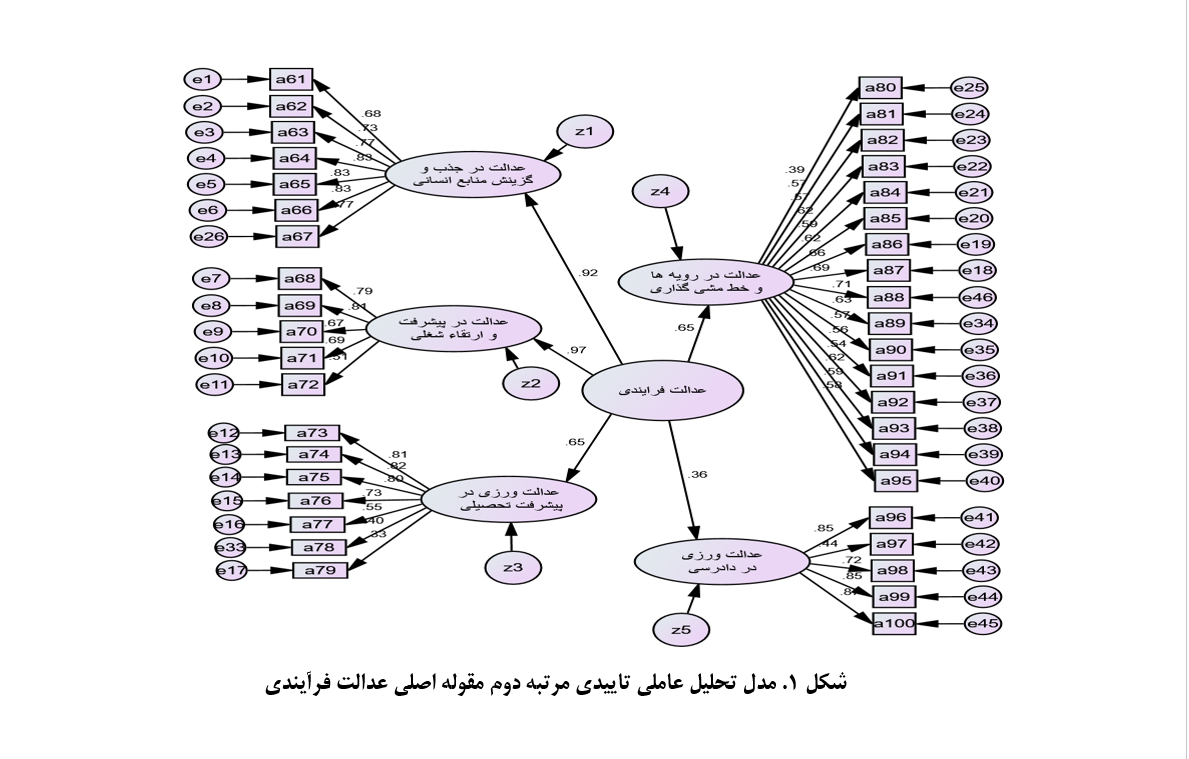اعتباربخشی الگوی عدالت آموزشی برای آموزش و پرورش عراق
کلمات کلیدی:
آموزش و پرورش, عدالت آموزشی, آموزش و پرورش کشور عراقچکیده
پژوهش حاضر با هدف طراحی و اعتباربخشی الگوی عدالت آموزشی برای آموزش و پرورش عراق انجام شد. پژوهش حاضر بر حسب هدف از نوع تحقیقات کاربردی و از لحاظ شیوه جمع آوری دادهها توصیفی از نوع پیمایشی میباشد. جامعه آماری شامل کلیه معلمان آموزش و پرورش کشور عراق به تعداد 1122345 نفر بوده است. از این تعداد مطابق با جدول کرجسی و مورگان(1970) تعداد 384 نفر برای شرکت در پژوهش انتخاب شدند. روش نمونهگیری در پژوهش حاضر خوشهای بود. ابزار گردآوری دادهها نیز پرسشنامه محقق ساخته بود. به منظور بررسی روایی ابزار سنجش از دو روش اعتبار محتوا(روایی صوری) و اعتبار سازه(رویکرد تحلیل عاملی تأییدی) استفاده گردید. برای تجزیه و تحلیل دادهها نیز از رویکرد تحلیل عامل تأییدی اعتبار با نرم افزار Amos استفاده شد. یافتهها نشان داد تحلیل عامل تأییدی مقوله عدالت در حوزه دانشآموزان، والدین، معلمین و مدیران بیانگر این بود که مفاهیم اولیه «دانشآموزان» با ضریب مسیر 98/. و «معلمان » با ضریب مسیر52/. «مدیران» با ضریب مسیر 35/. و «والدین» با ضریب مسیر 92/. دارای همبستگی قوی با عامل «عدالت در حوزه منابع انسانی» هستند و شاخصهایی قوی جهت اندازهگیری آن محسوب میشوند. همچنین مقادیر P برای کلیه مفاهیم اولیه این عامل کوچکتر از 5/. بوده که نشان دهنده ارتباط معنیدار هر مقوله با عامل اصلی مرتبه بالاتر از خود میباشد. میتوان نتیجه گرفت برای ایجاد عدالت اجتمکاعی پرداختن به شاخصها و متغیرهای مورد بحث این پژوهش ضروری است و لذا برنامهریزان باید بدانها توجه جدی نمایند.
دانلودها
مراجع
Asghari Bahambari H. Comparative Study of Educational Justice Policy in Malaysia and Iran. Comparative Studies
on Teacher Education (International Exploration Journal). 2023;2(1):55-84.
Ghasemi Ardehani A, Heydarabadi A, Rostami N. Family Backgrounds and Inequality of Educational Opportunities:
A Case Study of Female Secondary School Students in Ahvaz. Specialized Sociology Journal. 2013;1(1):127-47.
Papastephanou M, Zembylas M, Bostad I, Oral SB, Drousioti K, Kouppanou A, Tesar M. Philosophy of education in
a new key: Education for justice now. Educational Philosophy and Theory. 2022;54(8):1083-98. doi:
1080/00131857.2020.1793539.
Brighouse H, Unterhalter E. Measuring Justice: Education for primary goods or for capabilities?: Cambridge
University Press; 2010. 193-214 p.
Bezi A, Fakoori H, Bayani AA, Saemi H. Design and Validation of an Environmental Education Curriculum Model
for Higher Education Based on the "Aker" Approach. Iranian Journal of Educational Sociology. 2024;7(1):79-90. doi:
61838/kman.ijes.7.1.8.
Shariati F, Niazazari K, Jabbary N. Presenting a Model for Virtual Education Considering Educational Equity with a
Phenomenological Approach in Schools of Golestan Province. Iranian Journal of Educational Sociology. 2024;7(1):66-78. doi:
61838/kman.ijes.7.1.7.
Capatono J. The challenges of equity in public education. 2017.
Yamani N, Shaterjalali M, Eghbali B. Educational justice from the perspective of postgraduate students in a medical
school in Iran: A qualitative study. Research and Development in Medical Education. 2017;6(1):23-8. doi:
15171/rdme.2017.005.
Culp J. Educational justice. Philosophy Compass. 2020;15(12). doi: 10.1111/phc3.12713.
Bayat G, Ghasemi M. Conceptualization of Justice in Iranian Educational System: A Case Study of Elementary and
Secondary Schools' Text Books. Majlis & Rahbord. 2020;26(100):7-46.
Babadi Akasheh Z, Sharif SM, Jamshidian A. Providing and Extending Equal Opportunity and Educational Justice in
Education in Isfahan. Social Welfare. 2010;10(37):287-305.
Alaghehband A. Public administration. Tehran: Ravan Publication; 2019.
Sikandar A. John Dewey and his philosophy of education. Journal of Education and Educational Development.
;2(2). doi: 10.22555/joeed.v2i2.446.
Carley-Rizzuto K. bell hooks and Picture Books: Equity in Early Childhood Education. Early Years. 2022:1-12. doi:
1080/09575146.2022.2104818.
Freire P. Pedagogy of the oppressed In - Toward a sociology of education: Routledge; 2020. 374-86 p.
Rah Najat M, Negarestani MH. Examining Educational Justice in Light of the Law on the Establishment and
Management of Private Schools and Educational Centers. Public Policy Quarterly. 2024;10(1):143-57.
Roshan H, Shahraki Pour H, Dukanehifar F. A Model for Improving Teachers' Job Performance Based on Educational
Justice. Scientific Journal of Teaching and Learning Research. 2023;18(74):23-40.
Ahmadi M, Hazaarjiri J, Rahimi Adargani M, Tabaqiyan Gomi P. Culture, Educational Justice, Educational
Efficiency: A Meta-Analysis of Studies on Public and Private High Schools. Sociology of Culture and Arts. 2023;5(4):119-41.
Kaki M, Sadr A, Alizadeh Mofrad SM. The Impact of Educational Justice on Academic Performance, Satisfaction
with Education, and Academic Progress of Male Students in Secondary Schools in Abdanan. Specialized Social Studies
Education Research Quarterly. 2022;4(13):31-50.
Ghoreishi Ma-S, Nazari Zadeh Zar M, Bahrami B. Examining Educational Justice in Public Schools in Tehran.
Scientific Research Journal of School Management. 2021;9(1):265-80.
Torkashvond S, Yariqoli B, Moradian Mohammadiyeh W. Explaining the Challenges of the Digital Divide in
Implementing Educational Justice. Educational Technology. 2022;16(2). doi: 10.22061/tej.2021.7363.2527.
Pahang N, Mahdioun R, Yarigholi B. Investigating the Quality of Schools and Identifying Related Affecting Factors:
A Mixed Method Research. Journal of School Administration (JSA). 2017;5(1):173-93.
Pan X, Chen M, Hao Z, Bi W. The Effects of Organizational Justice on Positive Organizational Behavior: Evidence
from a Large-Sample Survey and a Situational Experiment. Organizational Psychology Journal. 2018;8:1-16. doi:
3389/fpsyg.2017.02315.
Sheikh T, Kor F, Saqainia A. The model of virtual education with an emphasis on educational justice during the corona
pandemic. Studies in Psychology and Educational Sciences (Center for the Development of Modern Education in Iran).
;8(2):248-68.
Kayaalp D. Educational justice praxis and cultural competence. European Journal of Social Science Education and
Research. 2022. doi: 10.26417/531kqr68w.

دانلود
چاپ شده
ارسال
بازنگری
پذیرش
شماره
نوع مقاله
مجوز
حق نشر 2024 نشریه پژوهش و نوآوری در تربیت و توسعه

این پروژه تحت مجوز بین المللی Creative Commons Attribution-NonCommercial 4.0 می باشد.










